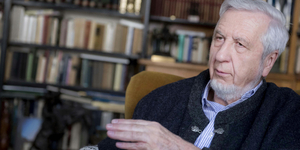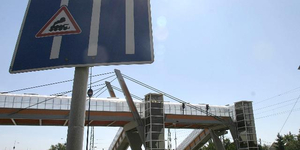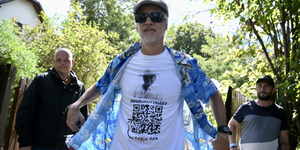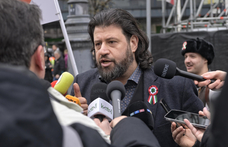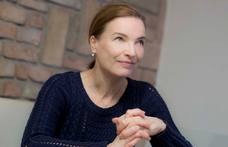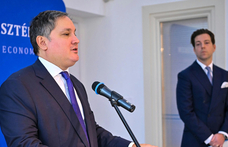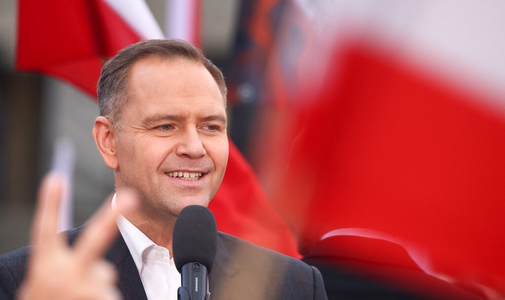Two days have passed since the Gyurcsány-Orbán debate. There is no clear verdict: Orbán seemed to be suffering from stage fright, but many commentators have claimed that public opinion may have found prime minister's seeming arrogance off-putting, and that this may cause a boomerang in the first round of the elections on Sunday. What do you think?
However much the press tries to talk up the significance of these kinds of debates, they are rarely the sole deciding factors in an election. Most people have already decided who they are going to vote for. Elections are about the two candidates' and the two parties' whole existence. Voters attach more weight to a party's actions in government and the careers of the people they are voting for than to a carefully constructed media event. Nonetheless, I think Ferenc Gyurcsány clearly defeated his rival on Wednesday. He simply overwhelmed Orbán. He said things to the Fidesz leader's face that the Left had been desperate to hear for ages. He might have changed rhythm slightly later on, taking a softer approach. But, if he by taking a substantially different approach he would have just made the event a draw. He might even have lost it, because Viktor Orbán's comments, based as they were on the Hungarians' centuries-old tradition of complaining, were more likely to meet agreement on the part of the audience than even the cleverest defence of reality. Hungarians, like so many other nations, hate statistics, references to macroeconomic indicators, and numerical proof of how well they are doing. There is a general feeling that we deserve much better.
But maybe Orbán's reticence and moderate responses to the attacks inspired sympathy and affection, even pity in many viewers?
In the eyes of much of the public, Viktor Orbán is an invincible hero - at his glance, walls will collapse. An invincible knight must prove his talent if he partakes in a duel. He must destroy his opponent with his devastating answers. But Viktor Orbán simply avoided the real argument. For a long while, he has only performed before his fans. Even without last Wednesday's fiasco, his fighting spirit is not the same as it was before. At Thursday's four-way debate, he changed his style, and, in different circumstances, he almost certainly did better than his opponents.
You are extremely critical of Orbán. Are you influenced in this by the fact that Fidesz did not put you on its party list this year?
Have you even read my commentaries? Since 1992, I have always taken a critical stance towards Fidesz. Once, at the beginning of his term as prime minister, Viktor Orbán said to me: "You have as much to do with Fidesz as I do." And I replied: "Fidesz is yours, but I have more to do with what began in 1988/89 than you do." The fact is, it is my duty to state my opinion, if only because many hundreds of thousands of centre-right voters expect me to. In 1998, millions of supporters of the Free Democrats, the original Fidesz, and the Antall centre supported Fidesz. But they rapidly became disenchanted with Viktor Orbán's political style, and in 2002 it was largely the centre-right's rejection of the party that led to its electoral defeat. I thought from the first that Fidesz could only be successful if it managed dynamically to reconcile national tradition with the needs of a modern middle class. It had to do this by becoming a broad-church party, uniting everyone from the liberal centre to the traditional right into a political force of the centre-right. Fidesz did not go in this direction, unfortunately. It is not a broad-church party today, merely a collective held together by its leader's charisma. Viktor Orbán governed according to the rules of the Western world, but what he said at home was just stubborn anti-Westernism. Fidesz represents the antipathy of the traditional right and the provinces towards a Western-style middle class.
In his interview with HVG.hu, Orbán gave a realistic analysis of the effects of globalisation, promised the best possible relations with the United States and invited liberals into his camp.
In his interview, Viktor Orbán did indeed give a perfect rendition of the liberal credo. He wants to win the elections, and hopes to use the votes of the centre to achieve this. If he wins, he will certainly act pragmatically. The third republic will not be endangered if he wins. But for a long while now, he has been basing his politics on the darker side of the Hungarian national character. In place of civic hopes, he builds his behaviour on instincts inherited from the Kádár era. It is clear that he does not much like the market or the constitutional separation of powers. I am sure he intends to stuff his planned fiscal council with many, many Zsigmond Járais.
But Orbán began as a liberal politician. What brought him over to the other side?
At first, the Fidesz president really did want to be a different kind of prime minister from that envisaged by the traditional right. But after 1992 he correctly saw that the Gyula Horn's Socialist Party would be the core of the political left-of-centre. The main opponents of an independent civic politics in the 1994 elections were going to be the Socialists. The then opposition bonded together to face down the Hungarian Democratic Forum. At the time, József Antall was more criticised than Viktor Orbán is today. The Left has always criticised the Right.
Fidesz, which seemed to be breaking this impasse, received much support from intellectuals. Fidesz's leadership rightly concluded that many were out to destroy their party. In 1994, Fidesz almost failed to get into parliament, partly because of their own mistakes. But the Free Democrats entered a coalition with the Socialists, who had won an absolute majority. But the Free Democrats' supporters did not follow their party when it crossed the deepest fault-line in Hungarian politics. In 1998, the party lost more than two-thirds of its camp.
But what happened to Fidesz and Viktor Orbán?
The Fidesz made a historically rapid switch to the other side of the political spectrum. They adopted the world view of the more radical wing of the traditional right. The ideas of the Hungarian Right had not developed over the post-war era and were still stuck in the inter-war period, a time that was not kind to market economies or parliamentary systems. Fidesz made little effort to create a new synthesis. They tried not to win the political centre, but to divide it in two. Their experience of 1993 and 1994 showed that their left-wing opponents would fight them in any case, making it best to strike first, and quickly.
Fidesz's land grab, seen by the Left as a sinful fall from innocence, was like a new conquest for the Right. But the enthusiasm of the radical Right is not enough to win an election in Hungary, so Viktor Orbán, holding to his role as leader, tried to draw the small man of the Kádár era away from the Socialists. He believes that anyone not in his camp is a communist. But by doing this, he has blurred the dividing line between communists and anti-communists.
The Socialist Party, a technocratic party, which two decades before ran a dictatorship in our country, a party which had served the interests of its own petit-bourgeois members, became the standard-bearer for new Hungarian capitalism, and a pillar of parliamentary democracy. The Free Democrats have retreated into becoming the intellectuals' doctrinaire micro-party. But if they were to leave parliament, civic politics, already weak, would be further undermined. Those 1.5m voters who support the emergence of a Western-style middle class now have no large party to turn to. But they should still make a careful choice between the two sides.

